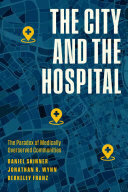
"In this project, sociologists Jonathan R. Wynn and Berkeley Franz and political scientist Daniel Skinner set out to examine why so many communities surrounding hospitals are economically distressed and medically underserved. On the one hand, hospitals anchor the communities that surround themoften staying in their communities for decades. Hospitals craft strategies to engage with the surrounding community, many of them focused on buying and hiring locally. On the other hand, hospitals will often only provide care to the surrounding community through emergency rooms designed to manage crises quickly, reserving advanced medical care and long-term treatment for those who can pay for it. Many hospitals buy real estate in their neighborhoods and advocate for development programs that drive gentrification and displacement. To understand how urban health care institutions work with their communities, the authors address power, history, race, and urbanity as much as the workings of the medical field. The project focuses on three urban hospitals: Connecticut's Hartford Hospital, the crown jewel of the Hartford Healthcare system; the Cleveland Clinic, which coordinates with other providers for routine care while its main campus provides specialty care; and the University of Colorado Hospital, a rare example of an anchor institution that moved out of its urban area. Through this examination, the authors recast urban hospitals in a new light: as not only medical institutions, but also a complex urban force"--